Ghana travel guide
2 minute summary
a vibrant introduction to
West Africa
.
About big sites. Forget the pyramids and the Big Five – this is about cosy community interaction, drumming, dancing and chiefs.
What we rate & what we don't
Our best & worst of Ghana vacations
Underrated
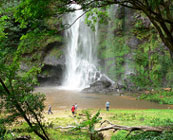

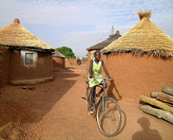
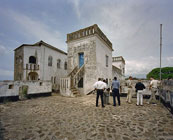
Volta Region
Bordered to the east by Togo and to the west by the Volta River, this region stretches from the tranquil lagoons and long Atlantic beaches of the south, through tropical forest filled with the sound of rushing waterfalls, and up to the rocky fringes of the northern desert. Ghana’s highest mountain, Afadjato, is also found here, as are the Ewe people, famed for their riotous festivals and beautiful, handwoven adanudo cloth.
Low key volunteering
The serial volunteering offenders exist in Ghana: orphanage placements, short term teaching, building classrooms. While these often cause more harm than good, there are a number of “quieter” opportunities which have proven benefits. These include protecting sea turtles along the coast, and building compositing toilets – which boosts a family’s health, wellbeing and dignity, as well as protecting the land.
The north
Borders are fluid in West Africa; culture is determined by ethnicity and language rather than national borders. The desert-like north, with its painted, mud-walled buildings, fearsome fetishes and rows of baobabs has far more in common with neighbouring Burkina Faso than with the lush south. Including it on your itinerary is a great way to explore more of this nation’s fascinating cultural and natural diversity.
Axim Region
Coastal Ghana is even more chilled out than the rest of the country, and spending a few days in the tropical beach surroundings of Axim gives the chance to meet local people from the Nzema tribe, eat fried fish at local restaurants, kayak along the coast and visit San Antonio Fort. Nearby, is one of Ghana’s last remaining tropical rainforests, and the Amamsuri wetlands are Ghana’s largest swamp forest.
Rated
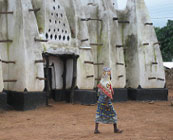
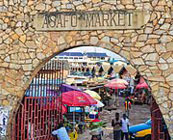
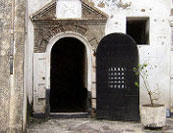
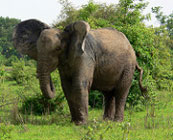
Culture
Locals may tell you there is no such thing as “Ghanaian culture” – and as you travel around from the Ashanti stronghold of central Ghana, past the pretty mosques of the more Islamic north, through the traditional fishing villages of the tropical coast and into the mud-walled compounds of the desert, you’ll see why. Each region and tribe has its own identity, beliefs, chiefs and kings – and they are all worth getting to know.
Ashanti Region
The Ashanti are Ghana’s largest tribe and one of its most colourful and vibrant. Their chaotic capital, Kumasi, has a thriving market and cultural museum, as well as many smaller “craft villages” which reveal rural Ashanti life and art. Meet chiefs and the king, attend a funeral (yes, really) and join the Akwasidae Festival, held every 40 days, for a real immersion in this fascinating culture.
Slave forts
Facing up to the evils of the past is a necessary and moving experience in Ghana. The West African coast is littered with slave forts, through which over 6 million slaves were estimated to have been shipped. The events live on in the Ghanaians’ collective memory, brought to life by the dungeons, forts and “Gates of No Return”, and educating yourself is a way to understand Ghana, Ghanaians and the shadow that slavery continues to cast over many parts of the world.
Mole National Park
While a number of large mammals live in Mole, including buffalo, hippo, hyena and numerous antelopes, visitors are drawn here by the elephants. See them on traditional game drives – or track them with a ranger on foot, for a fraction of what it would cost in the game parks of Southern or East Africa. Twitchers will be impressed with the 300 species of bird.
Overrated
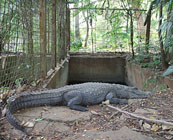
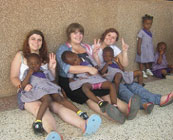
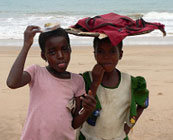
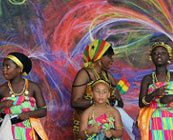
Zoos
It is possible to go on game drives in Ghana, but this is no Serengeti – you won’t see the Big Five. However, don’t think of making up for this with a visit to the zoos in Accra or Kumasi. These tourist attractions contain some of Africa’s greatest wildlife (lions, chimps, monkeys and hyenas) looking pretty sorry for themselves in bare cages. Head to Mole to see wild elephants – or just save the wildlife for another African trip.
Orphanage Volunteering
Ghana’s safety, stability and high number of orphanages has lured many well meaning travelers here over the years to volunteer with orphans. Parents die or get sick, can’t cope with all their children, or the children may be cast out as “spirit children”. However, inexperienced and unqualified short term volunteers do little to help – and in many cases make the situation worse. Look into other ways to help instead.
Street photography
Ghanaians are welcoming, smiling and often colourfully dressed; in short, they are a travel photographer’s dream. But please don’t take photographs of people without asking permission, or that characteristic smile may quickly fade. The chances are, most people will be happy to pose – or will even spot your camera and ask for a “snap”. But it’s just a matter of basic respect to ask first.
Punctuality
Conveniently for Europeans, Ghana is in the GMT time zone, which means no pesky jetlag. Unfortunately, GMT has a second meaning down here: Ghana Maybe Time. GMT is the best way to sum up the way things happen in Ghana: they might, or they might not. The solution is simply to relax, and remember that GMT is just as much of a cultural experience as Ghana’s music, dance, festivals and food.
Food, shopping & people
TRAVEL LIKE A LOCAL ON YOUR GHANA HOLIDAY
Eating & drinking in Ghana
Knowing a Ghanaian’s first, middle and surname can tell you a lot about them, including the day they were born, their birth order, whether they are a twin, and their tribe.
People & language
“Etesen?” “Me ho ye”– “How are you?” “I am well” (Twi)
“Akpe” – “Thank you” (Ewe)
“Tuma tuma!” – “Work work” , to greet someone who is working (Frafra)
Gifts & shopping
Fast facts
Ghana’s currency is the cedi – an Akan word meaning “cowry shell”. Shells were used in place of cash for many centuries, having been brought by Arab traders from the Indian Ocean.
How much does it cost?
Entry to Elmina Castle = £8.20
A brief history of Ghana
Ghana, Togo and Benin vacation, gold and magic
Traditional villages and voodoo in Ghana, Togo and Benin
Transatlantic slave trade tour, Ghana
Historical and cultural tour of Ghana
Ghana vacation, coastal tour
Explore the exciting beaches and nature along coastal Ghana.
A week in Ghana vacation
The perfect introduction to Ghana, run by locals
Ghana culture, nature and beach vacation
Explore Ghana’s stunning eco-beaches and unspoiled hotspots
Cultural history vacation in Ghana
Authentic Ghana Eco, Culture, History and Wildlife Tours
Ghana highlights and festival vacation
Celebrate Ghanaian culture & music at Afrofuture Festival
Voodoo Festival tour in Benin, Togo and Ghana
Experience the annual Ouidah Voodoo Festival
Film and photography volunteering in Ghana
Volunteer in the heart of an Ghanaian community
Ghana ancestral tour
Visit ancient traditional communities and a naming ceremony
Ghana wildlife safari, 4 days
Experience an Exciting Wildlife Adventure at Mole park
Ashanti tours in Ghana
Experience the ancient culture of the Ashanti Kingdom
Ghana coastal trekking vacation, Cape Three Points
A unique tour with the opportunity to see amazing Ghana.

















